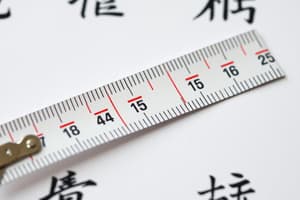Podcast
Questions and Answers
According to the Chinese remainder theorem, if we know that the remainder of n divided by 3 is 2, the remainder of n divided by 5 is 3, and the remainder of n divided by 7 is 2, what is the remainder of n divided by 105 (the product of 3, 5, and 7)?
According to the Chinese remainder theorem, if we know that the remainder of n divided by 3 is 2, the remainder of n divided by 5 is 3, and the remainder of n divided by 7 is 2, what is the remainder of n divided by 105 (the product of 3, 5, and 7)?
- 23 (correct)
- 24
- 25
- 26
According to the Chinese remainder theorem, if we know that the remainder of n divided by 2 is 1, the remainder of n divided by 3 is 2, and the remainder of n divided by 5 is 4, what is the remainder of n divided by 30 (the product of 2, 3, and 5)?
According to the Chinese remainder theorem, if we know that the remainder of n divided by 2 is 1, the remainder of n divided by 3 is 2, and the remainder of n divided by 5 is 4, what is the remainder of n divided by 30 (the product of 2, 3, and 5)?
- 10
- 11
- 9 (correct)
- 12
According to the Chinese remainder theorem, if we know that the remainder of n divided by 2 is 1, the remainder of n divided by 4 is 2, and the remainder of n divided by 6 is 3, what is the remainder of n divided by 12 (the product of 2, 4, and 6)?
According to the Chinese remainder theorem, if we know that the remainder of n divided by 2 is 1, the remainder of n divided by 4 is 2, and the remainder of n divided by 6 is 3, what is the remainder of n divided by 12 (the product of 2, 4, and 6)?
- 12
- 13
- 14
- 11 (correct)
According to the Chinese remainder theorem, if we know that the remainder of n divided by 2 is 1, the remainder of n divided by 3 is 2, and the remainder of n divided by 4 is 3, what is the remainder of n divided by 24 (the product of 2, 3, and 4)?
According to the Chinese remainder theorem, if we know that the remainder of n divided by 2 is 1, the remainder of n divided by 3 is 2, and the remainder of n divided by 4 is 3, what is the remainder of n divided by 24 (the product of 2, 3, and 4)?
According to the Chinese remainder theorem, if we know that the remainder of n divided by 2 is 1, the remainder of n divided by 3 is 2, and the remainder of n divided by 7 is 5, what is the remainder of n divided by 42 (the product of 2, 3, and 7)?
According to the Chinese remainder theorem, if we know that the remainder of n divided by 2 is 1, the remainder of n divided by 3 is 2, and the remainder of n divided by 7 is 5, what is the remainder of n divided by 42 (the product of 2, 3, and 7)?
Flashcards are hidden until you start studying





